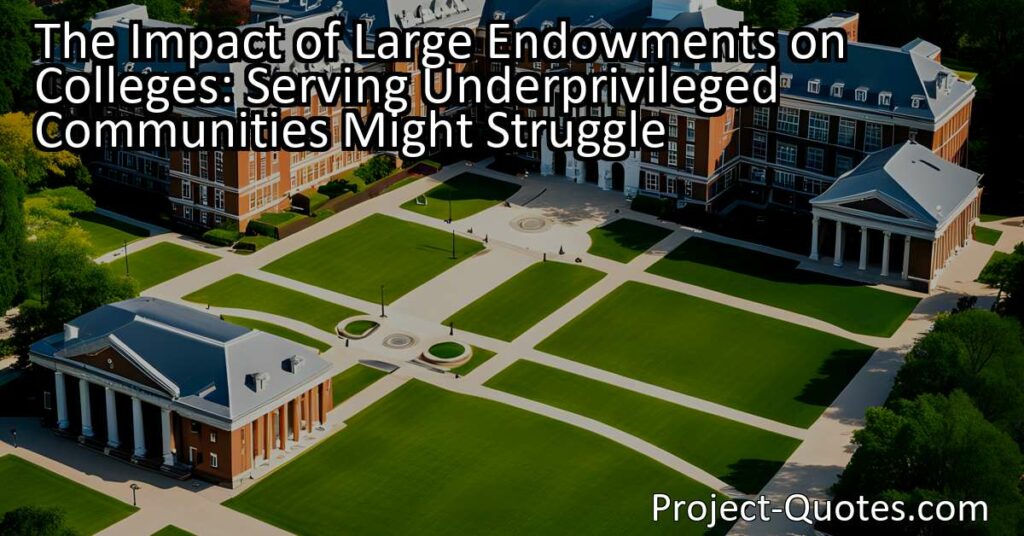Enquire what the effect of large endowments are upon colleges.
Ezra Cornell
Large endowments have a significant impact on colleges, but they can also create challenges for institutions serving underprivileged communities. While large endowments enable colleges to provide scholarships and attract top faculty, they can perpetuate educational inequality and hinder social mobility. It is crucial for colleges to find a balance between relying on endowments and diversifying their funding sources to ensure equitable and sustainable educational opportunities.
Table of Contents
Meaning of Quote – Enquire what the effect of large endowments are upon colleges.
Have you ever wondered about the impact of large endowments on colleges? Well, Ezra Cornell, the founder of Cornell University, certainly did. In his quote, Cornell brings attention to the question of how these financial resources can shape the educational landscape. So, let’s embark on a journey to explore the effect of large endowments on colleges and unfold the significance they hold.
To fully grasp the meaning behind Cornell’s words, we first need to understand what endowments are. In simple terms, an endowment is a sum of money or other assets that are donated to an institution, typically a college or university, to support its ongoing operations and programs. These funds are invested, and the returns are used to enhance the institution’s capacity, improve facilities, provide scholarships, and conduct research.
One of the most prominent effects of large endowments on colleges is the ability to provide financial aid to students. Imagine a student who dreams of attending college to pursue their passion but lacks the financial means to do so. In such cases, endowments become a lifeline. Colleges with substantial endowments are able to offer scholarships, grants, and other forms of financial aid, making education accessible for deserving students who might not otherwise afford it.
Moreover, large endowments allow colleges to attract and retain top-tier faculty members. Talented professors and researchers often seek institutions with strong financial support, as it enables them to focus on teaching and groundbreaking research rather than worrying about financial stability. Consequently, colleges with significant endowments can assemble a faculty body that is both highly knowledgeable and passionate about their fields, creating an enriching learning environment for students.
Beyond financial aid and faculty recruitment, substantial endowments enable colleges to enhance their educational programs and facilities. These resources are vital in providing students with diverse opportunities that enhance their learning experience. For instance, colleges can develop state-of-the-art laboratories, libraries, and technology centers, allowing students to access cutting-edge resources for their academic pursuits. Additionally, endowments can support the establishment of research centers, promoting innovative studies that contribute to advancements in various fields.
In essence, what Ezra Cornell highlights in his quote is the transformative power of large endowments on colleges. These financial resources serve as a catalyst for change, propelling institutions to new heights and opening doors that may have otherwise remained closed. It is through endowments that colleges can continuously evolve, adapt to emerging trends, and remain at the forefront of educational innovation.
However, it is essential to consider the potential challenges and controversies surrounding large endowments. One critique often raised is that some colleges may become overly reliant on their endowments, neglecting other sources of revenue and losing touch with the realities outside their financial safety net. This dependency can hinder the institution’s flexibility and responsiveness to economic fluctuations or changing educational demands.
Furthermore, the disparities in endowment sizes among colleges can perpetuate educational inequality. While prestigious universities with massive endowments can offer extensive resources and opportunities to their students, smaller colleges or those serving underprivileged communities might struggle to compete on the same level. This disparity in resources can create an uneven playing field, hindering social mobility and reinforcing existing societal divisions.
To address these concerns, it is crucial for colleges to strike a balance between relying on endowments and diversifying their funding sources. By actively seeking external partnerships, conducting successful fundraising campaigns, and expanding alumni networks, colleges can ensure they are not solely dependent on their endowments. Additionally, increasing transparency and accountability in managing endowments can help prevent misuse or misallocation of funds, ensuring that they are effectively utilized for the betterment of the institution and its students.
In conclusion, the effect of large endowments on colleges is undeniable. They provide the financial stability necessary to establish scholarships, attract exceptional faculty, enrich educational programs, and enhance facilities. These resources allow colleges to offer opportunities and financial aid to deserving students, support groundbreaking research, and remain at the forefront of educational innovation. However, it is essential to address the potential challenges associated with large endowments to ensure educational equality and effective use of funds. So, let us appreciate the transformative power of endowments while also striving for a more equitable and sustainable educational environment.
I hope this quote inspired image brings you hope and peace. Share it with someone who needs it today!


